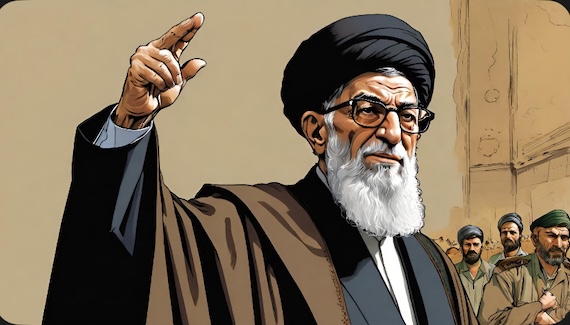By Farhang Morady, University of Westminster
The Israeli prime minister, Benjamin Netanyahu, has said that his country’s campaign in Iran “could certainly” lead to regime change. In an interview with Fox News on June 15, he called the government in Tehran “very weak” and added that, given the opportunity, “80% of the [Iranian] people would throw these theological thugs out”.
Israel’s military actions so far indicate that its goals probably do extend beyond eliminating Iran’s nuclear programme. Airstrikes have targeted military leadership, internal security facilities and the headquarters of Iran’s state broadcaster. Israel’s aim is seemingly to destabilise the regime by inciting a popular uprising and fragmenting elite support.
Tehran, meanwhile, has been eager to project an image of strength and stability. It has sought to illustrate its resilience and unity through constant coverage by state media, highlighting its military readiness while also broadcasting public displays of loyalty. Government officials have also visited affected regions.
This raises the question: is more than four decades of theocratic rule in Iran really as close to collapse as Netanyahu says it is?
The Israeli attacks have exposed weaknesses in the Iranian state. Several senior military officials and top nuclear scientists have been killed, while Israel has been able to strike targets in the Iranian capital, Tehran, with relative ease after crippling Iran’s air defences.
Strategic sites in Iran have proven vulnerable, with nuclear sites and military command headquarters hit hard. Many residents of Tehran have fled to other cities fearful that the situation will worsen.
However, despite inflicting significant damage, the strikes have not caused the downfall of the regime’s core institutions. The deaths of at least 20 key commanders prompted the Iranian supreme leader, Ayatollah Ali Khamenei, to reshuffle Iran’s military leadership to maintain stability and control. New appointments were made swiftly.
And, at least publicly, the Iranian elite is maintaining its position that the country can endure the crisis without giving in to foreign pressure. Khamenei has even warned the US president, Donald Trump, that the US will “face irreparable harm” should it become involved in the conflict.
Diplomatic manoeuvres behind the scenes, however, suggest the regime is demonstrating a willingness to compromise to ensure its survival. An unverified Iranian diplomatic statement on June 16 even indicated that the regime would be willing to suspend uranium enrichment to maintain itself.
The Iranian government is probably displaying confidence in public as a strategic move to prevent domestic unrest. Iran is facing significant economic, political and social challenges. Over 60% of its population is under 30 years old, and this demographic is increasingly disconnected from the principles promoted by the regime.
Widespread protests erupted in 2022 following the death of a young woman called Mahsa Amini while she was in police custody for allegedly violating hijab regulations. The protests demonstrated deep-seated discontent with the regime and its morality laws that dictate women’s attire and public behaviour.
The protests were suppressed, but underlying discontent remains. Israeli leaders hope that striking Iran might start a chain reaction leading to an uprising that topples the Islamic Republic. Israel’s defence minister, Israel Katz, hinted as much on June 19. He said the military has been instructed to intensify strikes on targets in Tehran in order to destabilise the “Ayatollah regime”.
No imminent collapse
Despite immense pressure, the collapse of Iran’s theocratic regime is not imminent. It continues to hold authority over its military and controls the media. The regime sustains itself through its powerful institutional base rather than public approval.
Opposition movements are also fragmented and lack an organised structure. Groups like Mojahedin-e-Khalq and the movement led by Reza Pahlavi, the exiled eldest son of the last shah of Iran, have sought to gain influence with western support. However, they lack popular backing within Iran.
The Islamic Republic appears to be on a path of gradual deterioration rather than complete collapse. However, Trump does appear to be warming to the idea of helping Israel overthrow the government in Tehran. And any US involvement would intensify pressure on the regime significantly.
On June 17, Trump described Khamenei as an “easy target” who is safe only “for now”. Trump has since said his patience with Iran had run out, saying “I may do it, I may not do it” when asked a question about US involvement in Iran.
The US possesses the 30,000-pound “bunker buster” bomb capable of damaging Iran’s deep-lying uranium enrichment facilities and the B-2 stealth bomber to carry it. And it has been moving military assets to its bases in the Middle East.
It is uncertain whether these actions represent direct provocation or simply an attempt by Trump to exert more pressure on Iran to negotiate an end to the conflict.

“Defiance,” Digital, Dream / Dreamland v3, 2025
Trump’s camp is split over potential US involvement in Iran. Some US military and intelligence officials – including the director of national intelligence, Tulsi Gabbard – have expressed concerns about a direct confrontation.
It is also possible that Israeli and US attempts to impose a change of government in Iran could even unite the regime. The Islamic Republic has a history of using foreign pressure to justify domestic crackdowns and increase its domestic control.
The external efforts to accelerate the collapse of the regime could, somewhat counterintuitively, help the regime survive in the short-term while deeper internal problems continue to exist.![]()
Farhang Morady, Principal Lecturer in International Development, University of Westminster
This article is republished from The Conversation under a Creative Commons license. Read the original article.


 © 2025 All Rights Reserved
© 2025 All Rights Reserved